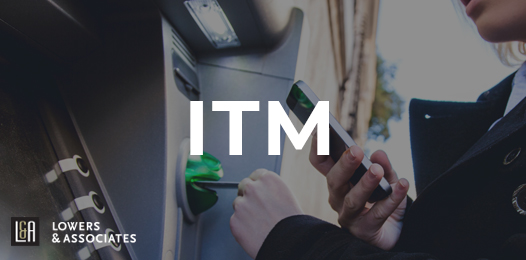
The Rise of the ITM and the Related Rise in Risk

Interactive Teller Machines (ITMs) are proving to help solve many of today’s retail banking challenges and are becoming more prevalent as a result. This rise is changing the landscape for banking, and equally, for the cash servicing and cash-in-transit industry.
ITMs are on the rise for a number of reasons. Perhaps most significant is that ITMs can serve many customers’ needs (up to 80% of typical retail transactions can be completed by today’s interactive tellers) and reinforce the brand at a lower cost than a human teller. This allows ITMs to be used in situations where the traditional brick-and-mortar bank is too expensive to build and operate or is simply impossible for other reasons.
There are several situations where banks find ITMs a compelling solution.
Addressing industry consolidation.
Consolidation in the banking industry is leading to over-banked locations where banking systems are merging and their markets partially overlap (think of Wells Fargo’s acquisition of Wachovia during the Great Recession). With their interactive capabilities and wide range of services, ITMs can provide a good substitute for a human walk-up teller for many transactions. Where branch locations have to be closed, the ITM can carry on the bank’s functions at a much lower cost and continue to serve that local market.
Serving remote locations.
Rural banks often find ITMs a good way to project a presence in remote locations and capture new customers at a lower cost. These banks were among the early adopters of interactive tellers and continue to expand the use of them.
Expanding the bank’s presence.
At the other end of population density, ITMs can be a good option for a bank that wants a retail presence in every shopping mall or airport. These walk-up tellers offer on-the-fly banking convenience to a population that is time-challenged and unlikely to make special trips to a traditional outlet.
Serving the unbanked.
Finally, ITMs can help banks reach the unbanked. This is actually a serious social problem in some areas, barring people from getting the kind of track record they need for a good credit history or for a secure way to manage money. The ITM can sometimes be the safer and cheaper option to a payday lender.
As you can see from these examples, banks have a lot of different reasons to expand the ITM network. However, the presence of ITMs is also shown to increase the risks of CIT carriers. First, there are machines in a variety of locations, which demands an understanding and response to a variety of risks. Banks will have a wider range of policies and procedures that need to be accommodated. Carriers will confront more challenging physical environments where typical mitigation measures may be inadequate.
Furthermore, the ITM machines themselves pose new threats. Since they have much wider service capabilities, they demand more intricate and time-consuming servicing than ATMs. Consider a typical deposit image ATM with a total service time of 12-15 minutes to complete the cash swap, cash deposit pull, imaged check retrieval, receipt paper change, captured card processing, etc. with the management of three receipts and typically one or two denominations. In comparison, ITM service time extends to 18-22 minutes with additional bagging procedures, management of coin, additional denominations inclusive of $100 notes, and up to eleven receipts to manage. This level of exposure and service time increases even further when you consider the security impacts of servicing ITMs in drive through lanes where ITMs are stacked or back to back with one another.
The rise of the ITM is an opportunity for CIT carriers to expand their role in the cash management system. As with most opportunities, there are embedded threats as well. The carriers who can learn to mitigate the added risks will reap the rewards.
To learn more, get a copy of our CIT Carrier’s Guide to Building Your ITM Program.
ABOUT THE AUTHOR